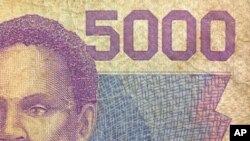On the first business day of the new year, central Freetown was strangely quiet. Normally these streets are bursting with commercial activity and choked with the traffic of vehicles and people going about their business.
But the majority of shops here closed their doors in protest against the government's introduction of an all-in-one consumer tax that adds 15 percent to the price of many goods and services.
Many here feel the timing is wrong and the percentage too high for a country regarded as one of the poorest in the world. Business owners say they are still struggling with the effects of the global downturn.
Thirty-three-year-old Nenneh Turay runs Faris International, a computer shop downtown. She also refused to open for business Monday.
Turay says the Goods and Services Tax is fair. But it will only work if the general public fully understands it. Right now, she say, people are complaining that the tax is too high.
Many shopkeepers say their customers are unwilling or unable to pay the higher prices.
The Goods and Services Tax, known here as the GST, was introduced on January 1 to raise essential revenue for government development programs.
It has replaced a group of outdated sales and service taxes, as part of government efforts to streamline revenue management and wean the country off its heavy dependence on donor aid.
Value-added taxes have been criticized for placing the burden on society's poorest, who pay a greater percentage of their income than the rich. But the government says the tax should have little or no effect on the cost of living.
The goods and services on which Sierra Leoneans spend the majority of their income are exempt from taxation. Essential everyday purchases such as rice, milk, medicine, transport and educational materials are not liable.
Assistant Commissioner of Sierra Leone's National Revenue Authority, Alfred Akibo-Betts, says the tax is nothing new. He says the new year's protest stemmed from a misunderstanding about the Goods and Services Tax.
"So yesterday there was some confusion as to how to actually charge the tax. And the main issue there is that some businesses were mistakenly adding 15 percent on top of the prices of December 31," he said.
Akibo-Betts says the government has now assured skeptical business owners that they will be refunded for taxed goods bought before 2010.
In 2007, Nigeria tried to raise its value-added tax from 5 to 10 percent, sparking a national strike that forced the minister of finance to lower the rate again. But in neighboring Ghana, a VAT of 12.5 percent currently provides the government with its main source of revenue.
In Freetown, one downtown shopkeeper agreed to discuss the new tax on condition of anonymity. Her customers are mostly civil servants and she doesn't want to lose business.
She says the GST is a fair tax. If it works as well for us as it did for Ghana, then it will help to build roads and hospitals and we will benefit. But, she says, the government should have waited for the global economic crisis to pass before introducing the tax. Now people are complaining about money, she says. And with this tax, they are really feeling the pinch.
She also says that the government should have done more to educate the public about the new tax. Posters, she says, are not enough to make people understand.
For Akibo-Betts, the Goods and Services Tax will not only reduce costs for business people but also make it easier for the government to collect revenue. Now, he says, companies will be able to claim back taxes paid on operating costs.
He says the tax is sustainable and will move Sierra Leone's economy forward.
In the business district of Sierra Leone's capital, Freetown, this new year did not herald the usual commercial bustle. The majority of businesses were closed in mass protest of a new all-in-one consumer's tax introduced by the government four days ago.








